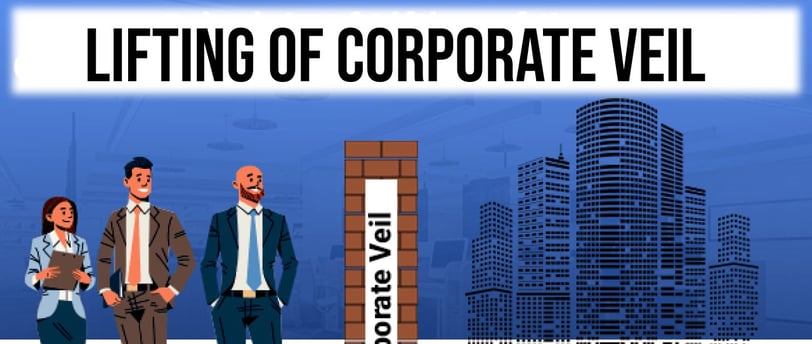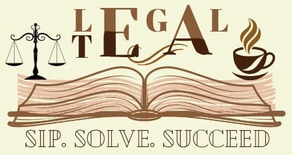Unmasking the Corporate Entity: A Deep Dive into Lifting the Corporate Veil
In corporate law, one of the most essential principles is that a company is a legal person separate from the individuals who own or manage it. This idea was firmly cemented in the landmark case of Salomon v. Salomon & Co. Ltd. [1897] AC 22, and it has shaped the way businesses operate ever since. However, this legal boundary isn’t set in stone. There are situations where courts look past the corporate facade — a process known as lifting (or piercing) the corporate veil — to hold the real culprits accountable when the company is misused.
Priya Jassi, 3rd year, BA, LLb
4/24/20253 min read


The Roots: Where It All Began
The story starts with the historic Salomon case, which laid the groundwork for corporate personality.
The Backstory:
Mr. Aron Salomon ran a boot and shoe business as a sole trader. Later, he incorporated it as a limited liability company — Salomon & Co. Ltd. — with himself, his wife, and five children as shareholders (thus meeting the legal requirement of seven members). In return for transferring his business to the company, he received shares and debentures (secured debt). But when the company ran into financial trouble, unsecured creditors argued that Mr. Salomon should be held personally liable — after all, he was essentially the company.
Legal Question:
Was the company truly a separate legal entity, or just a shell for Mr. Salomon’s personal business?
The Verdict:
The House of Lords ruled in Favor of Mr. Salomon. They held that once a company is incorporated, it becomes a distinct legal person — even if one individual hold most of the control. The corporate structure could not be dismissed just because it served Mr. Salomon’s personal interests.
Why It Matters: This case gave rise to two powerful ideas:
The doctrine of separate legal personality
The concept of limited liability, protecting shareholders from personal loss beyond their investment
These principles created the modern foundation for entrepreneurship by allowing individuals to do business without risking everything they own.
When the Veil Gets Lifted: The Other Side of the Coin
While the Salomon decision reinforced corporate independence, it also opened the door for potential misuse. Courts soon recognised that this legal shield could be weaponised for fraud, deception, and avoidance of legal duties. To address this, the judiciary developed the doctrine of lifting the corporate veil.
In simple terms, this allows the court to set aside a company’s legal identity to hold its controllers — directors, shareholders, or managers — personally responsible. But this is not done lightly. It’s usually reserved for situations where the company is being used as a tool for wrongdoing.
When Do Courts Lift the Veil?
Courts consider lifting the corporate veil in scenarios such as:
1. Fraud or Misrepresentation
If the company is being used to commit fraud or manipulate others unfairly.
2. Evasion of Legal Obligations
When the corporate setup is merely a trick to dodge existing laws or agreements.
3. Sham or Façade Entities
If the company exists only on paper and is essentially an alter ego of an individual.
4. Public Interest or National Security Risks
Especially in cases involving foreign control during wartime or sensitive matters.
Key Judicial Precedents: How the Courts Have Applied This
Some landmark judgments have shaped how and when the corporate veil may be lifted:
Gilford Motor Co. Ltd. v. Horne (1933)
Mr. Horne created a company solely to bypass a non-compete clause from his previous employer. The court saw through this and held the company was a sham.
Jones v. Lipman (1962)
Here, a man transferred property to a company he owned to avoid a court order. The court pierced the veil, enforcing the original agreement.
Delhi Development Authority v. Skipper Construction Co. (1996)
The Supreme Court of India found that multiple companies were used to mislead investors and siphon funds. The veil was lifted to hold the real people accountable.
State of Rajasthan v. Gotan Lime Stone Khanij Udyog (P) Ltd. (2016)
This case dealt with a restructuring used to bypass mining laws. The court nullified the deal and disregarded the corporate setup.
Other Notable Situations
1. Agency relationship
In Smith, Stone & Knight Ltd., the court held that if a company acts as an agent for another, liability can pass on to the principal.
2. Enemy Companies
In Daimler Co. Ltd. v. Continental Tyre and Rubber Co. (1916), the court looked past incorporation to determine that a company was effectively controlled by enemies during wartime.
Why It Still Matters Today
In today’s fast-paced, highly globalised business environment, lifting the corporate veil continues to play a critical role. It helps tackle:
• Complex corporate fraud
• Aggressive tax evasion strategies
• Bankruptcy abuse
• Environmental violations
• Cross-border money laundering
In India, the Companies Act, 2013 gives regulators and courts more robust tools to tackle such misuse. The principle of lifting the veil ensures that legal protections aren’t misused as shields for unethical behaviour.
Conclusion: Balance Between Protection and Accountability
The corporate veil isn’t just a legal abstraction — it’s what allows businesses to grow, take risks, and innovate without constant fear of personal loss. But like all powerful tools, it comes with responsibility.
The doctrine of lifting the corporate veil ensures that corporate identity cannot be exploited to commit injustice. While the law respects the separation between a company and its stakeholders, it also reminds us that no structure is above scrutiny when fairness and public interest are at stake.
Ultimately, form must give way to substance — and the courts will step in when justice demands it.
References:
Lifting of Corporate Veil under the Companies Act, 2013 – LawLex
The Doctrine of Lifting the Corporate Veil – LawBhoomi
Lifting of Corporate Veil – LawColumn
Salomon v. Salomon Case Summary – Drishti Judiciary
Case Commentary: Salomon v. Salomon – LawTeacher.net
Because Every Legal Mind Deserves a Great Conversation.
Legaltea.in@gmail.com
+91 6284295492
MSME Certified
© 2025 Legal Tea. All rights reserved.


